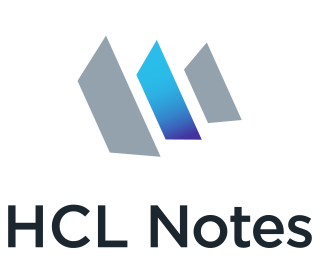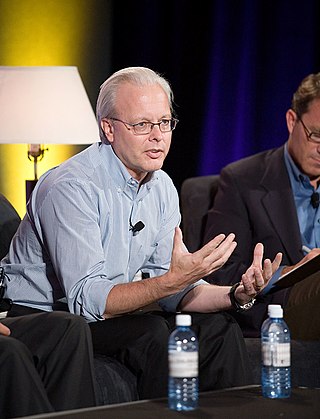Related Research Articles

Lotus 1-2-3 is a discontinued spreadsheet program from Lotus Software. It was the first killer application of the IBM PC, was hugely popular in the 1980s, and significantly contributed to the success of IBM PC-compatibles in the business market.

HCL Notes is a proprietary collaborative software platform for Unix (AIX), IBM i, Windows, Linux, and macOS, sold by HCLTech. The client application is called Notes while the server component is branded HCL Domino.

Lotus Improv is a discontinued spreadsheet program from Lotus Development released in 1991 for the NeXTSTEP platform and then for Windows 3.1 in 1993. Development was put on hiatus in 1994 after slow sales on the Windows platform, and officially ended in April 1996 after Lotus was purchased by IBM.
Lotus Software was an American software company based in Massachusetts; it was sold to India's HCL Technologies in 2018.

Data General Corporation was one of the first minicomputer firms of the late 1960s. Three of the four founders were former employees of Digital Equipment Corporation (DEC).

Novell, Inc. was an American software and services company headquartered in Provo, Utah, that existed from 1980 until 2014. Its most significant product was the multi-platform network operating system known as Novell NetWare. Novell technology contributed to the emergence of local area networks, which displaced the dominant mainframe computing model and changed computing worldwide.
Ashton-Tate Corporation was a US-based software company best known for developing the popular dBASE database application and later acquiring Framework from the Forefront Corporation and MultiMate from Multimate International. It grew from a small garage-based company to become a multinational corporation. Once one of the "Big Three" software companies, which included Microsoft and Lotus, the company stumbled in the late 1980s and was sold to Borland in September 1991.

CA Technologies, Inc., formerly Computer Associates International, Inc., and CA, Inc., was an American multinational enterprise software developer and publisher that existed from 1976 to 2018. CA grew to rank as one of the largest independent software corporations in the world, and at one point was the second largest. The company created systems software that ran in IBM mainframe, distributed computing, virtual machine, and cloud computing environments.

Raymond "Ray" Ozzie is an American software industry entrepreneur who held the positions of Chief Technical Officer and Chief Software Architect at Microsoft between 2005 and 2010. Before Microsoft, he was best known for his role in creating Lotus Notes.
Lexmark International, Inc. is a privately held American company that manufactures laser printers and imaging products. The company is headquartered in Lexington, Kentucky. Since 2016 it has been jointly owned by a consortium of three multinational companies: Apex Technology, PAG Asia Capital, and Legend Capital.
Groove Networks was a software company based in Beverly, Massachusetts. Founded by Ray Ozzie, the creator of IBM's Lotus Notes application, the privately held company specialized in productivity software that allows multiple users to work collaboratively on computer files simultaneously.
QAD Inc. is a software company that provides enterprise resource planning (ERP) software and related enterprise software to manufacturing companies. The company has customers in over 100 countries around the world.
Cullinet was a software company whose products included the database management system IDMS and the integrated software package Goldengate. In 1989, the company was bought by Computer Associates. Cullinet was headquartered at 400 Blue Hill Drive in Westwood, Massachusetts.

Mercury Interactive Corporation was an Israeli company acquired by the HP Software Division. Mercury offered software for application management, application delivery, change and configuration management, service-oriented architecture, change request, quality assurance, and IT governance.
Jim Manzi is the former chairman, president and CEO of Lotus Development Corporation and is currently a private investor in various technology start-up ventures.
Microsoft is a multinational computer technology corporation. Microsoft was founded on April 4, 1975, by Bill Gates and Paul Allen in Albuquerque, New Mexico. Its current best-selling products are the Microsoft Windows operating system; Microsoft Office, a suite of productivity software; Xbox, a line of entertainment of games, music, and video; Bing, a line of search engines; and Microsoft Azure, a cloud services platform.
Len Kawell is an engineer and entrepreneur who once worked at Digital Equipment Corporation (DEC), where he was one of the designers of the VAX/VMS operating system. He also played a key role in the development of the MicroVAX computer, VAX Notes, and VMC Mail. Like DEC co-founders Harlan Anderson and Ken Olsen, Kawell graduated from the University of Illinois with a degree in computer science.
IBM Forms is a suite of products by IBM's Lotus Software division that interact to develop and deliver data-driven, XML-based electronic forms (e-forms) to end-users. IBM Forms consists of a server, designer, and client viewer that enable creation, deployment, and streamlining of forms-based processes. IBM Forms originally used Extensible Forms Description Language (XFDL) as the format for its electronic forms, and it has gradually added XForms to XFDL as that standard has matured.
Software Publishing Corporation (SPC) was a Mountain View, California–based manufacturer of business software, originally well known for its "pfs:" series of business software products, it was ultimately best known for its pioneering Harvard Graphics business and presentation graphics program.
Informix Corporation, formerly Informix Software, Inc., was a software company located in Menlo Park, California. It was a developer of relational database software for computers using the Unix, Microsoft Windows, and Apple Macintosh operating systems.
References
- 1 2 "COMPANY NEWS; Lotus Buying Developer Of Its Notes Software". The New York Times. May 24, 1994.
- ↑ Rifkin, Glenn (January 15, 1996). "Lotus Notes And I.B.M.: Still Happy Together?". The New York Times.